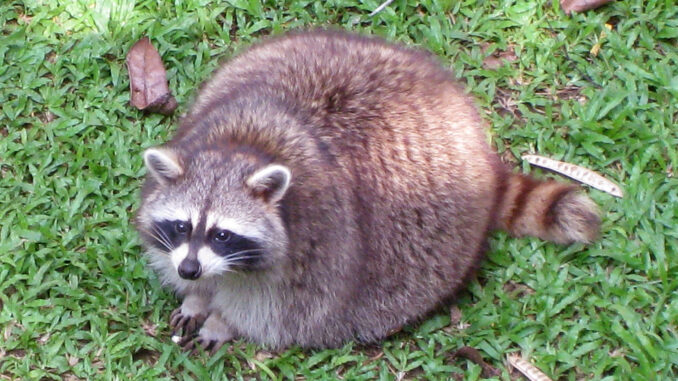
Wondering if pregnant raccoons come out during the day? Pregnant raccoons may come out during the day, driven by the need to forage for extra food due to increased nutritional requirements. While primarily nocturnal, they adapt their behavior to meet specific needs during daylight hours.
In this brief exploration, we’ll delve into whether pregnant raccoons alter their habits and venture out into the daylight, offering insights into their intriguing behaviors during this significant phase of their life cycle.
Table of Contents
Do pregnant raccoons come out during the day?
Pregnant raccoons may come out during the day, primarily driven by the need to forage for extra food due to increased nutritional requirements. However, it’s important to note that they are not inherently aggressive during this time. While they may exhibit assertive behavior to secure food resources, it’s generally a survival instinct rather than aggression towards humans.
While their primary activity period remains nighttime, pregnant raccoons may adapt their behavior to fulfill increased nutritional needs and ensure a secure resting place for themselves and their offspring.
Pregnant raccoon behaviour
Daytime Behavior:
- Resting: Pregnant raccoons often rest during the day in secure and secluded locations, such as tree hollows or attics, to ensure safety for themselves and their offspring.
- Foraging: While primarily nocturnal, pregnant raccoons may occasionally forage during the day to meet increased nutritional requirements, targeting food sources like fruit trees, gardens, or garbage cans.
- Adaptability: Raccoons are adaptable creatures, and pregnant individuals may tolerate daytime activities, especially in urban environments with less human disturbance.
Nighttime Behavior:
- Nocturnal Activity: Raccoons are naturally nocturnal, and pregnant females maintain this behavior, being more active and engaging in various activities during the night.
- Foraging and Hunting: Nighttime is when pregnant raccoons actively search for food, using their keen senses to hunt and forage efficiently.
- Securing Resting Places: Pregnant raccoons utilize the darkness of the night to secure safe and quiet resting places, such as dens or hidden spots, for themselves and their offspring.
Table: Common Changes in Pregnant Raccoon Behavior
| Behavior | Description | Implications |
| Increased Resting Time | Pregnant raccoons may rest more during the day. | Preserving energy for pregnancy and childbirth. |
| Daytime Foraging | Seeking food sources during daylight hours. | Meeting increased nutritional needs. |
| Nesting Behavior | Creating nests in safe, secluded areas. | Preparing for the arrival of their offspring. |
| Altered Movement | Changes in activity levels and movement patterns. | Adapting to physical changes during pregnancy. |
Does a pregnant raccoon sleep in the open during day and night?
Pregnant raccoons exhibit a distinct preference for safe and open sleeping spots both during the day and night. In the daytime, they seek elevated locations like tree hollows or rock crevices, providing a secluded and secure environment away from potential threats. These daytime retreats serve as peaceful resting places for the expectant mothers.
Come nighttime, pregnant raccoons often choose open spaces for their nocturnal activities. Dens or cozy spots in open areas become their preferred sleeping sanctuaries, allowing for heightened awareness and quick escapes if needed. This strategic selection of sleeping locations underscores the adaptability of pregnant raccoons, ensuring a balance between rest and vigilance as they prepare for the arrival of their offspring.
Frequently Asked Questions (FAQs) About Pregnant Raccoons’ Daytime Behavior
Q1: Do pregnant raccoons come out during the day?
A: Yes, pregnant raccoons may venture out during the day, primarily driven by the need to forage for extra food due to increased nutritional requirements. While their primary activity period remains nighttime, they may adapt their behavior to meet specific needs during daylight hours.
Q2: Are pregnant raccoons more aggressive during the day?
A: No, pregnant raccoons are not inherently aggressive during the day. While they may exhibit assertive behavior to secure food resources, it is generally a survival instinct rather than aggression towards humans. Caution and observation from a distance are recommended to ensure safety for both humans and raccoons.
Q3: What prompts pregnant raccoons to forage during the day?
A: Pregnant raccoons may forage during the day to fulfill increased nutritional needs associated with pregnancy. Seeking out additional food sources becomes essential for their well-being and the successful development of their offspring.
Q4: How long are raccoons pregnant, and how can you tell if a raccoon is pregnant?
A: Raccoons are typically pregnant for about 63 days. To identify pregnancy, observe changes in behavior, such as increased foraging, nesting activities, and potential weight gain. Observing changes in a raccoon’s body size, particularly in the abdominal region, can indicate pregnancy.
Q5: Can pregnant raccoons adapt their daytime behavior in urban environments?
A: Yes, pregnant raccoons may adapt their behavior in urban areas with less human disturbance. They may become more tolerant of daytime activities, emphasizing their adaptability to different environments to meet their specific needs during pregnancy.
Conclusion:
The behavior of pregnant raccoons, whether during the day or night, reflects their remarkable adaptability and survival instincts. These intelligent creatures strategically choose resting spots that prioritize safety and security for both themselves and their soon-to-arrive offspring. While predominantly nocturnal, pregnant raccoons may adjust their activities to meet increased nutritional needs during the day.
